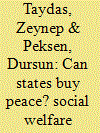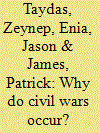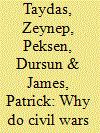|
|
|
Sort Order |
|
|
|
Items / Page
|
|
|
|
|
|
|
| Srl | Item |
| 1 |
ID:
112776


|
|
|
|
|
| Publication |
2012.
|
| Summary/Abstract |
This study examines whether the state's ability to provide social welfare services has any major effect on the probability of civil conflict onset. We argue that welfare spending contributes to sustaining peace because the provision of social services reduces grievances by offsetting the effects of poverty and inequality in society. Welfare spending serves as an indication of the commitment of the government to social services and reflects its priorities and dedication to citizens. By enacting welfare policies that improve the living standards of citizens, governments can co-opt the political opposition and decrease the incentives for organizing a rebellion. Utilizing time-series, cross-national data for the 1975-2005 period, the results indicate that as the level of the government investment in welfare policies (i.e. education, health, and social security) increases, the likelihood of civil conflict onset declines significantly, controlling for several other covariates of internal conflict. Additional data analysis shows that general public spending and military expenditures are unlikely to increase or decrease the probability of civil unrest. Overall, these findings suggest that certain types of public spending, such as welfare spending, might have a strong pacifying effect on civil conflict, and therefore the state's welfare efforts are vital for the maintenance of peace.
|
|
|
|
|
|
|
|
|
|
|
|
|
|
|
|
| 2 |
ID:
087338


|
|
|
|
|
| Publication |
2009.
|
| Summary/Abstract |
The purpose of this review is to identify a framework for understanding the internationalization of ethnic conflict. We examine three approaches that purport to explain escalation-namely extension, interaction, and transformation-and emphasize the fact that each theory by itself lacks full explanatory power. Synthesis that focuses on factors from state and society, which shape the decision to become involved in ethnic strife is essential. Examination of the preceding factors reveals that institutional configurations and ethnic composition indeed do limit future options available to states and influence the distribution of capabilities among leaders of groups. The main conclusion of this essay is that ethnic diversity in a society and high constraint on state action are optimal conditions for overcoming insecurity.
|
|
|
|
|
|
|
|
|
|
|
|
|
|
|
|
| 3 |
ID:
108518


|
|
|
|
|
| Publication |
2011.
|
| Summary/Abstract |
The purpose of this article is to review major theoretical arguments with regard to the causes of civil war and identify problems associated with the conceptual juxtaposition of opportunity versus grievance that predominates in the field. While they are critical aspects of conflict processes, perception of opportunity and grievance as two mutually competing explanations or separate categories ultimately can limit, rather than facilitate, our understanding of civil conflicts. For example, we show that not all motives can be designated easily as deriving from one or the other. In addition, the existing dichotomous framework masks other important questions about the way that collective action is achieved in some circumstances and not others or the way that some factors seem to generate grievances at one stage, perhaps, but then an opportunity at another or vice versa. Thus the priority should be to develop an integrated, comprehensive approach that can account for fundamental aspects of complex conflict processes. We conclude by providing suggestions for future research on civil conflict.
|
|
|
|
|
|
|
|
|
|
|
|
|
|
|
|
| 4 |
ID:
099849


|
|
|
|
|
| Publication |
2010.
|
| Summary/Abstract |
As states get stronger, they are expected to be more successful in preventing insurgency and, in turn, the occurrence of civil wars. While intuitively appealing, the theoretical and empirical understanding of the linkage between state capacity and civil war onset remains at an early stage of development. To date, the role of state capacity has been conceptualised and measured in limited ways that focus mainly on the repressive ability of the state. In this paper, we broaden the understanding of state capacity by incorporating an important but neglected dimension; institutional quality. We examine the relationship between institutional quality and civil war onset and argue that states characterised with high institutional quality are less likely to experience civil war. Analysis of cross-national time-series data from 1984 to 1999 reveals that the quality of institutions, defined as freedom from corruption in government, rule of law, and bureaucratic quality, plays a significant role in explaining the likelihood of civil war onset.
|
|
|
|
|
|
|
|
|
|
|
|
|
|
|
|
|
|
|
|
|